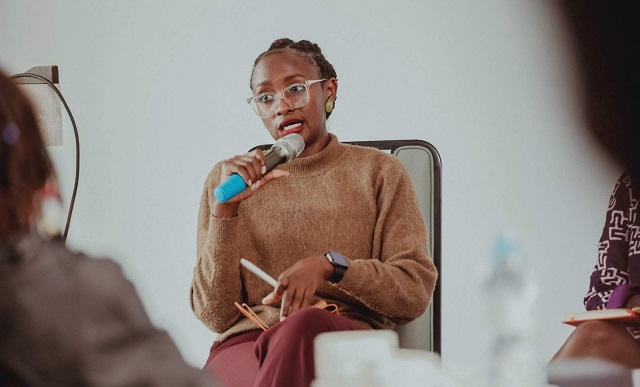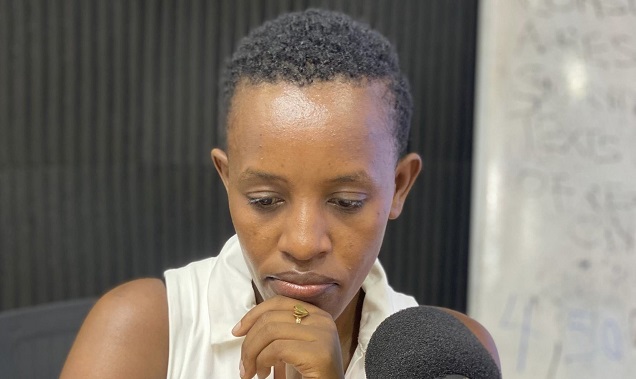
ANALYSIS | IAN KATUSIIME | Safina Virani, a Ugandan feminist and activist, recalls a pivotal moment from about a year ago when her tweet against child marriage in the Middle East went viral.
“I got bullied from all sides; Christians, Muslims, Arabs—they were like, ‘Oh, you westernized people, you American,’ because they had the assumption that I was American,” she shares during our interview at a restaurant in Kampala.
The tweet about child marriage led to an influx of emails and threats, prompting her to remove her email from her Twitter profile and, for the first time, make her account private.
“That was the one time I had to dissociate my profile from my work because they would go on the website and look for my email to send me threatening emails,” says Safina, who serves as the Co-Director of Frauen Initiative Uganda, a women-led community organization that provides a safe space for victims of sexual violence.
“They would Photoshop my face onto naked bodies… it was insane. As a feminist, you develop a tough skin so that such things don’t affect you as much because you know the work you’re doing is controversial, and not everyone will appreciate it,” she explains. “I can’t say you get used to it, but you learn to live with it. Still, it is mentally taxing.
In her journey as an activist, Safina has battled all kinds of threats ranging from attempts to hack into her account and stalking her. Bullying is something she gets almost every day.
“We like to call it online misogyny. It’s basically when you get attacked for something that you say because you are a woman or a feminist,” she narrates.
“It happens a lot when I give a controversial opinion. If it’s supporting Gaza, they will say she’s an Arab…so my identity changes all the time. If it’s a feminist tweet, they will say, oh you white people.”
To counter these threats, Safina employs certain measures for her safety and for that of the women (the victims of sexual violence) who reach out to her. “After I get sensitive information through my DMs, I delete on my end. I tell them to delete on the other end too in the event that the account gets hacked.” Any further conversation has to happen on encrypted channels like Signal.
For women whose AI-generated images are being shared, there’s a remedy. There are several websites where such images can be uploaded that prevent them from being shared. “The snake is cut from the head. I use this tool a lot,” she states.
For ride hailing apps like Uber and Safe Boda and through which a number of women have reported harassment, Safina maintains two separate numbers as a precaution.
She cautions against posting one’s location in real time when attending events as this would make for easy targeting.
Frauen initiative which Safina co-founded reports attempted hacks on its website almost every week with unknown people trying to get access to their emails and passwords. “I was surprised to learn how often that happens,” she says. The organisation’s work has angered a number of people and she reckons they need extra digital security.
Safina is now more renowned because of her posts condemning Israel’s genocide in Gaza that she keeps churning out on her X account. “I have always been pro-Palestine,” she declares. Her posts can generate up to 20,000 Retweets triggering approval and hate in equal measure.
Her advocacy for Palestine has earned her a steady drumbeat of wrath.
Since the war in Gaza started in October 2023, the cyber threats Safina has faced as a pro-Palestine activist have escalated. Here is here what they sound like: ‘I am gonna find you and rape you,’ ‘I wish you get raped.’
She says many prominent female pro-Palestine voices have faced the same threats online since social media is virtually the only defence they have against Israel’s might.
Some of the people attacking her have reported her to the other organisation she works for, FRIDA Young Feminist Fund. They do this by tagging FRIDA in tweets asking her for firing. Luckily for her, her employer stands with Palestine.
Most of these are bot accounts which appear faceless but with the intent to drive a certain agenda. But Israel has also hired specific influencers who constantly push back on the activism by the likes of Safina. However, she is unfazed and takes back the fight.
“When you troll me online, I will troll you back,” she remarks gleefully.
“I will let you know that I am a bigger bully.” She takes pride in the fact that it’s hard to bully her.
She has had clashes with spokespersons of the Israeli government but she is familiar with their template which goes along the lines of ‘You’re a Hamas supporter. How are you a feminist and you support rape?’ “I don’t really take them seriously,” she says.
Safina is now accustomed to getting LinkedIn notifications of US State Department employees looking her up which she finds amusing. “America is not really a country I strive to go to,” she points out.
Western donors pull out funds
Incidentally, some western donors have pulled funding from FRIDA because of its pro-Palestine stance. “What’s the point of working with people whose politics don’t align with yours as an activist? I don’t see myself lowering my voice. It’s a bloody genocide, why would you support it?” she asks.

Agather Atuhaire, an activist and whistleblower who heads Agora Discourse, a public accountability NGO, has faced her fair share of digital threats. Two years ago, Atuhaire blew the lid on a procurement scam where the Speaker of Parliament Anita Among splashed millions of taxpayers’ money on new luxury SUVs.
She has spearheaded an online campaign called #UgandaParliamentExhibition, which exposes the corruption and embezzlement of funds associated with Speaker Among, highlighting an unprecedented ostentatious display of wealth. Given the powerful individuals she has challenged, Atuhaire has faced a familiar accusation: being labeled a foreign agent.
“We have always faced attacks for how we are agents of imperialists, how we are working for visas and asylum, how we are working for people to give us money, and so forth,” she tells The Independent in a virtual interview.
Agora was active during the #March2parliament protests that started on July 23 and ran for a couple of weeks. The mobilization for the protests was done online with a few protestors hitting the streets.
It was from these protests that Agora faced criticism from the Ugandan government and other actors that it was a foreign funded-organisation. Since most of Agora’s work is online on X, the attacks and push back played out in hashtags and tweets. Agora’s critics said it should come clean on who it receives funding from.
Many people rallied to Agora’s defense, stating that the NGO is accountable to its donors and emphasizing that its funders are clearly listed on its website.
Ignoring bullies
For Atuhaire, it was a familiar playbook. “I don’t usually respond. I see that as propaganda aimed at distracting us and deflecting,” she says. “I ask people to respond to the issues and facts we raise. Let them impeach our facts or dispute them instead of deflecting.”
Atuhaire is randomly slut shamed online in the course of her work in spite of being a journalist and a lawyer.
Ignoring people who make such accusations and starving them of engagement has become one of her tried and tested tactics.
“I don’t respond. A few times, I have responded in a way that takes away that power from them. For example, when I am told I am sleeping with multiple men, I ask ‘how is that a problem for Ugandans?”
She adds, “We are talking about people stealing resources for children that are dying, how does me sleeping around even if I was sleeping with one hundred men, affect Uganda?… That has sort of died off.”
“I do that not just for me but for other women that might be silenced because someone is playing that card.”
She explains, “When I see someone’s motive is to attack, not to ask questions I can provide answers for, I ignore.”
But even when you disarm online bullies, there is no denying the impact it has on your mental wellbeing. Atuhaire takes occasional breaks from X in what is usually called an online detox.
“The work takes a toll on you emotionally, because you are dealing with the emotional baggage of everyone else; the political prisoners, their families, people who have been abused in one way or another, corruption, the attacks come in and you get overwhelmed so the only thing to do is to take a break.”
Edna Ninsiima, a feminist, writer and communications consultant, has dealt with a lot of bullying and “internalized misogyny” on social media.
“There’s a ganging up that happens. A lot of times it was through dog whistling, someone comes onto a post and then says something…kind of calling the others to the ring,” she explains.
She recalled a time she tweeted saying the whole concept of a friend zone is rooted in a very patriarchal rape culture. “Because there was barely any critical thinking, it dragged on for days and then there’s a whole timeline of people mocking you saying derogatory things and mostly bullying you,” Ninsiima says.
She also talks about the ways in which homophobia was used against her.
“When you are a woman advocating for feminist politics, the thing that misogynists can use against you is homophobia. They will say Edna is having sexual relations with another woman…so this is supposed to make you say I don’t want to be associated with being a lesbian so let me back out.”
Ninsiima adds, “Even myself at that point, I wasn’t yet okay with being accused of being a lesbian or unlearning conditioned homophobia.”
She would often hear of WhatsApp groups where fabricated stories were being discussed. “So then it becomes, ‘oh they are just pushing an agenda, they are just sleeping together which would infantilise the movement.”
She stresses that it was significantly worse for some of her “comrades” who are queer because of how rife homophobia is in Uganda. In addition, she cites how feminists are always called ugly, unmarried, bitter women–labels that are meant to derail them.
Being hyper visible as a feminist was a tall order for her. Someone once threatened
to release naked pictures of her. “I had a good idea there was no chance those pictures were out there but I started to question myself. But I thought maybe someone took them without my consent as it happens a lot of the time. I spent like a whole three days terrified.”
The same person also threatened to knock her down with a car. “It messes with your mind. If you are not experiencing it or are part of the bullies, it doesn’t register with you,” she says.
But in spite of it all, Ninsiima and her feminist comrades did find a way to counter the digital threats.
“What we did was to stick together on and offline. Online, there was a thing of ‘They will come for you’ they being the feminists. So people would say to us ‘oh you guys cleaned the timeline. Misogynists became afraid to say certain things. You may think it but you won’t say it,” she says with a hint of pride.
“The counterattack, was if you are coming for Edna, you are coming for all of us. If someone was going through it, there was concerted support from all the comrades,” she recalls.
When she had to cover a book launch, all her comrades came for the event as a form of solidarity and security. Banding together was a way of guarding against the many threats they faced.
They also signed up for digital security trainings just to learn the basics like two factor authentication and the like.
The block button
But another well-known measure proved effective: blocking.
“A lot of times abusers thrive on access. In any circumstances when you revoke that access, they can’t access you. Blocking was very helpful.”
But there was pushback on that too earning Ninsiima the moniker, block master. This included a sharing of screenshots among those who had been blocked by her.
“It was frowned upon then. How dare you revoke access? I am proud to see today where women say just block.”
Muting of conversations was also helpful, she adds. “Continued interaction with abuse has very dire consequences on your mental and even physical health as I saw because I went into therapy for this.”
Ninsiima as a writer has been a victim of plagiarism which she considers a digital threat but also “good old misogyny.” A young man plagiarized an article from her blog and it was published in a prominent newspaper. “This is a story that has been published on a blog that is not obscure; it has enough readers and has been re-shared many times online,” she says.
“The misogyny is in just assuming that a young man can write. If it was a young woman…I cannot confirm but they may do some due diligence,” she adds.
Ninsiima cites the fact that the person who plagiarized her work is part of a prolific young professionals’ program, as a troubling issue. She said that since it was not the first time he was plagiarizing work, on top of the editors not doing their gatekeeping work, perpetuates a lack of accountability.
“He has a whole community of intellectual friends who are mentoring him, how haven’t they figured it out?” she asks.
Mercy Awino, a lawyer and activist, found her calling during the #March2Parliament protests. She has been an engaged activist since then. Her tweet telling off President Museveni when he called the young protestors “Bazzukulu” (grandchildren) garnered attention for its boldness and take no prisoners’ attitude.

A few days later, she received a call from an unknown number with the typical threat: “We know where you stay and why are you joining the wrong people? We shall come for you.” Her parents called her to caution her since people were calling them too.
Months into activist duty, Awino is now getting the drill. For those that raise issues, she engages but for the trolls, she ignores while for those that make threats, she hits the block button.
“I am deliberate about sharing my location with my friends for when I am at court and when I am at work in case anything happens,” she tells The Independent in an online interview.
She undertook a training on digital and physical safety by Defend Defenders, a human rights defenders organisation—which she found helpful and applies what she learnt daily.
As an activist, Awino has grasped the reality in her line of work. “The first thing to understand is that a dead activist is no activist. Whatever we do it is very important to make sure that we are being safe while doing it,” she says.
Digital laws used to silence political critics
Uganda has the Computer Misuse Act 2011 as the only piece of legislation against digital threats but the government has mostly used it go after critics as opposed to protecting the digital rights of Ugandan citizens.
“Given the current political landscape, it is very possible that you could be disappeared or harm could be suffered upon your family,” she reckons.
She shares tips with her ilk through “an actors analysis” so as to weigh one’s actions against their outcomes. “If I speak out against police, what kind of reaction would I get form the police or the public; who would be my ally, who would be threatened, and what is the magnitude of that threat?”
Awino states that the situation may be different when everyone else is speaking out on the same issue. “But when an issue gains traction and brings you a lot of attention because you are the only one raising it, the risk rises and your security goes up,” she cautions.
“You inform other networks of human rights defenders: I am going to do this, and this is the kind of feedback I may get, she says, “Be alert, have the legal people involved and those that offer protection, so that if anything happens, they are able to come in time.”
****
This story is an outcome of a DW Investigative Journalism Fellowship on Digital Threats
 The Independent Uganda: You get the Truth we Pay the Price
The Independent Uganda: You get the Truth we Pay the Price



